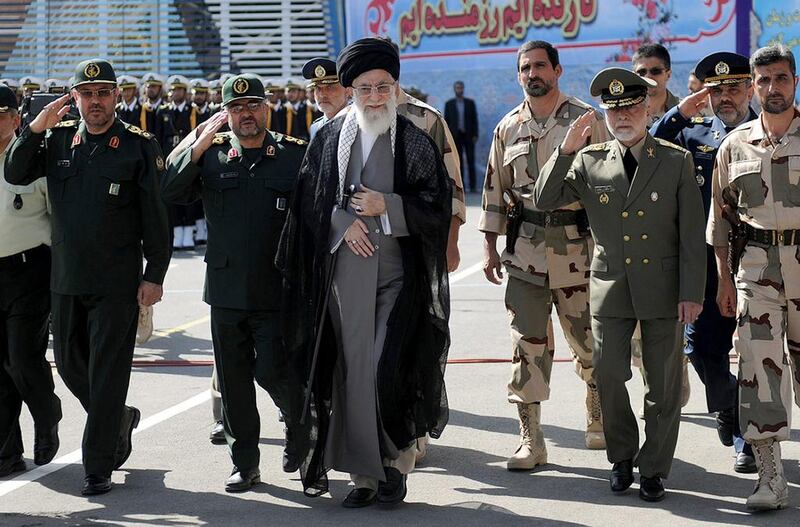Iran’s supreme leader, Ayatollah Ali Khamenei, has voiced vital support for president Hassan Rouhani’s policy of outreach to the West but criticised as “not appropriate” some aspects of his recent trip to the UN General Assembly.
The hardline ayatollah did not specify what he objected to, but analysts said he was likely referring to the historic phone call between Mr Rouhani and his US counterpart, Barack Obama. Their reportedly good-natured, 15-minute chat on September 27 was the first presidential-level contact between Tehran and Washington since Iran’s Islamic revolution 34 years ago.
“We support the government’s diplomatic movements … and support what was in this last trip,” Mr Khamenei said yesterday. But, he added: “Of course in our opinion some of what occurred in the New York trip was not appropriate.”
The comments were the first by the supreme leader since Mr Rouhani returned to Tehran, where some hardliners, including commanders of the powerful Revolutionary Guard, criticised the phone call as a “tactical mistake”.
But other hardline bastions, including Friday prayer leaders and a majority of MPs in Iran’s conservative-dominated parliament, have given Mr Rouhani their staunch support.
Meanwhile, Mr Obama yesterday disclosed that US intelligence agencies believe Iran continues to be a year or more away from building a nuclear weapon, an assessment that is at odds with Israel, which contends Tehran is on a faster course towards a bomb.
Mr Rouhani has said he wants the nuclear dispute wrapped up within three to six months. John kerry, the US secretary of state, said last week a deal could come even sooner “depending on how forthcoming and clear Iran is prepared to be”.
The US president expressed optimism about the blossoming diplomacy between his administration and Iran’s new president, but said Washington would not accept a “bad deal” on the nuclear programme.
“Rouhani has staked his position on the idea that he can improve relations with the rest of the world,” Mr Obama said. “And so far, he’s been saying a lot of the right things. And the question now is: can he follow through?”
Mr Khamenei had previously said he no longer opposes direct talks with Washington to resolve Iran’s nuclear stand-off with the West but was not optimistic about their outcome. He repeated his deep mistrust of the US in strong terms yesterday.
“We are pessimistic about the Americans. The US government is untrustworthy, supercilious and unreasonable, and breaks its promises,” he said in a speech to military commanders.
His remarks appeared aimed at assuaging jittery hardliners while simultaneously cautioning Mr Rouhani against pressing too fast for a potential rapprochement with the US.
For Saeed Laylaz, a pro-reform political commentator in Tehran, Mr Khamenei’s criticism should not overshadow the new softer tone in Iran’s foreign policy.
“Even if the supreme leader is critical, one should not forget that without his permission, the diplomatic initiative would not have been put in action in the first place,” he said.
The Obama administration has also delivered tough messages that analysts say are aimed at damping domestic opposition to a possible nuclear deal with Iran.
Wendy Sherman, the under secretary for political affairs at the US State Department and lead negotiator with Iran, urged Congress on Thursday to hold off imposing additional sanctions against Tehran before new nuclear negotiations later this month. But she said the US would insist on comprehensive negotiations, noting of Iran, “we know that deception is part of the DNA”.
Mr Rouhani won an unexpected election victory in June on a platform of bringing his country in from the cold and easing choking international sanctions imposed over Iran’s nuclear programme. Substantive new negotiations on Tehran’s atomic ambitions between Iran and six world powers, including the US, are to begin in Geneva on October 15.
Mr Khamenei also lambasted the US yesterday for its alliance with Israel, whose prime minister, Benjamin Netanyahu, said in his speech to the UN last week that Mr Rouhani is a “wolf in sheep’s clothing” and urged no let-up in sanctions pressure against Iran.
The American administration “is a government that is seized by the international network of Zionism, and has to put up with the usurper [Israeli] regime and show flexibility towards it,” Mr Khamenei said.
Mr Netanyahu warned in New York that Israel was ready to go it alone in taking military action to prevent any possibility of Iran developing a nuclear weapons capability.
Mr Khamenei declared any such action would meet a “harsh” response.
“We hear the repetitive and disgusting threats of the Iranian nation’s enemies,” he said. “Our response to any mischief will be serious and harsh.”
mtheodoulou@thenational.ae





